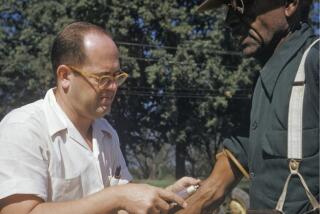‘White America Doesn’t Know Us’
- Share via
There is an inversive fear that pervades black America. In one sense, it is deeply rooted and pulverizes the spirit. In another, it’s depressingly homogenized and unrelenting.
When actor Danny Glover was waiting for a cab in New York City, he feared that the cabdriver would not stop for him because he is black. The cab driver didn’t and later admitted he has an underlying fear of black people.
When there was a job opening for a top executive management position in corporate America last month, whites feared that a minority would fill the position, but at the same time, blacks feared that they would be passed over for the position because of skin color. And nearly 40 years after the Civil Rights Act, there are still many white Americans who fear living next door to a black person; there are still Korean store owners who follow their black customers around the store because of fear and suspicion and there are women of every color who clutch their purse or change directions if a black man is walking toward them.
I was in a popular drugstore looking for a hair product. Surprisingly, it was not in aisle 4 with the other hair products. It was in the front of the store, locked up in a glass cabinet with a bolt lock. The hair colors and perms kits for African American women were the only products locked and marked “ethnic products” even though Los Angeles is a city where there is a diversity of ethnicities. The items were locked because management feared that these items would be stolen if unlocked.
Why is the fear of blacks held so tenaciously in this country? For many whites, crime wears a black face. According to the Bureau of Justice Statistics, black males have a 29% chance of serving time in prison at some point in their lives; white males have a 4% chance. Almost one in three young black males between the ages of 20 and 29 is under some form of correctional control compared with one in 15 young white males and one in eight young Latino males.
But these statistics don’t tell our whole story. The numbers don’t represent who we are. The message that black America is deteriorating and dysfunctional is transmitted every day. But what’s not transmitted is the truth about black America: Every young black male walking down the street is not armed and extremely dangerous. Every dark-skinned man is not a thief, a thug, a crack head or an ex-con; all of our communities are not ghettos; every black woman pushing a stroller is not a single mom on welfare; there are black men and women who work every day and earn an honest living and black children who can read cohesively, write persuasively and analyze deductively.
The myth is that all Americans are welcomed and protected on these shores and that this country tolerates diversity. Despite the end of legal segregation, a sense of our positive identity is lacking. The “black only” and “white only” signs are down, but our skin color still creates negative attitudes, rigid fears, distorted beliefs and misconceptions.
When a black man stands innocently in the doorway of his apartment and is shot 19 times and killed, then it’s time to find other ways to bring about change in America.
White Americans are afraid of us because they don’t know us. They don’t know our capabilities, our achievements, our versatility. They don’t know about our integrity, our self-determination, our entrepreneurships and quest for higher education. They don’t know we have assets, inventions, investments and we do more than hip-hop, dunk, rap and commit crimes.
We must seek to dispel the negative stereotypes that create this fear and denigrate our image. Until we do this, racial harmony might not be achieved. We can push for new laws, but laws change policies, not attitudes. Affirmative action has generated a diversity of skin colors in the workplace and on college campuses, but there are still many people who do not feel comfortable around those who are different from them. If we push for new laws while there are still misconceptions about who we are, then this inverted fear will continue to dangle precariously.
Fear of blacks should be un-Amercian. Black Americans know that there is nothing dangerous about being black, but those who fear us must discover it too.
More to Read
Sign up for Essential California
The most important California stories and recommendations in your inbox every morning.
You may occasionally receive promotional content from the Los Angeles Times.













